2023届高考英语复习:定语从句课件 (共17张PPT)
文档属性
| 名称 | 2023届高考英语复习:定语从句课件 (共17张PPT) | 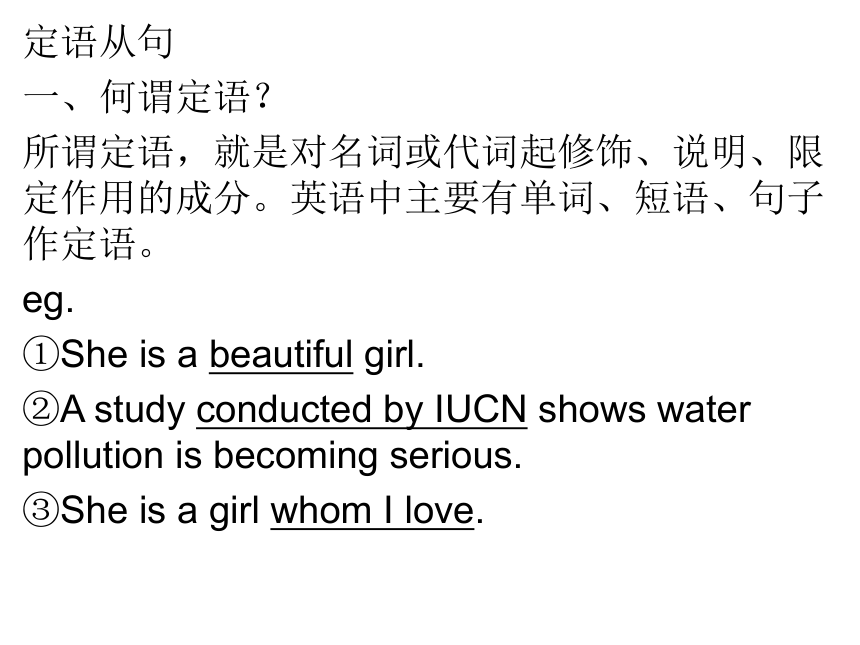 | |
| 格式 | pptx | ||
| 文件大小 | 142.6KB | ||
| 资源类型 | 教案 | ||
| 版本资源 | 通用版 | ||
| 科目 | 英语 | ||
| 更新时间 | 2023-03-21 09:31:24 | ||
图片预览

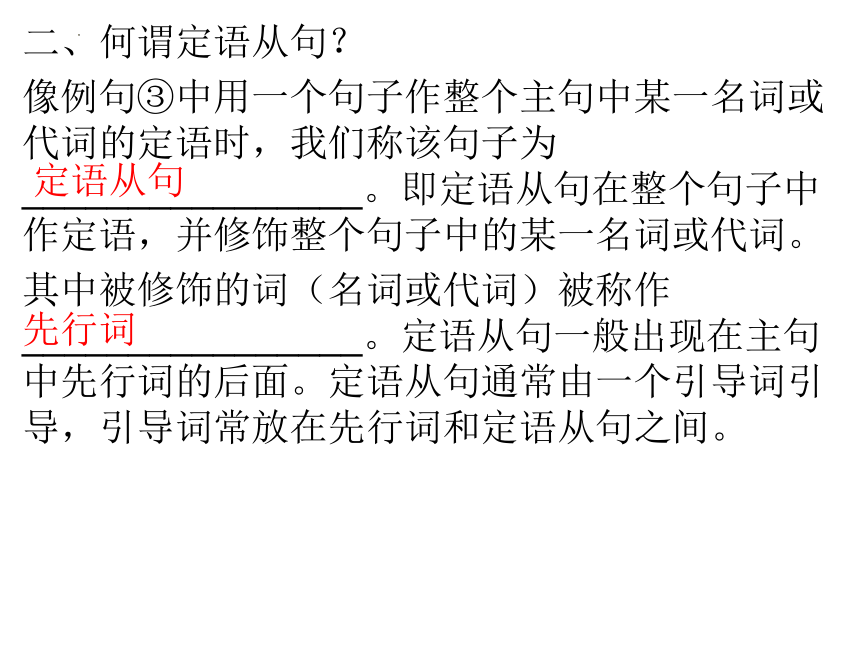
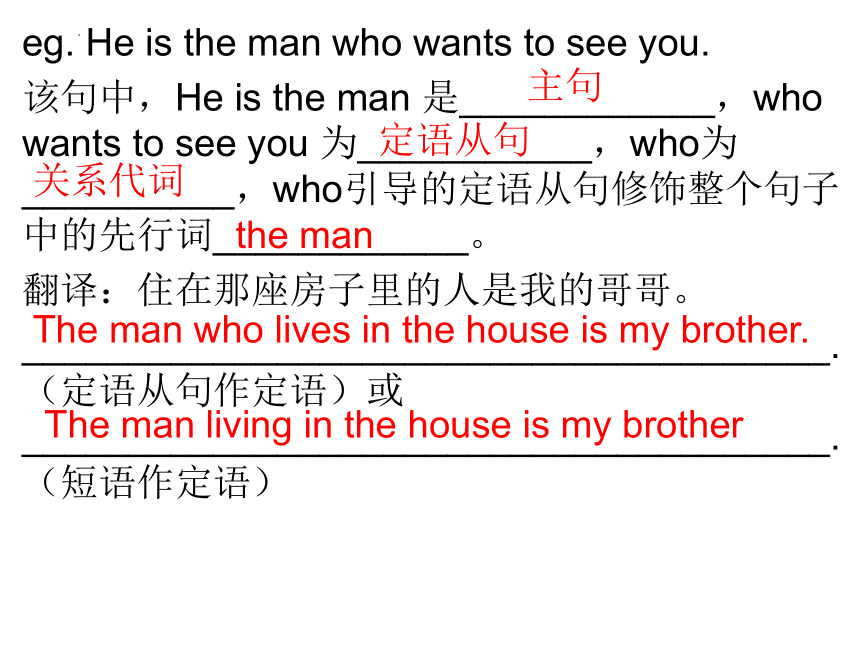
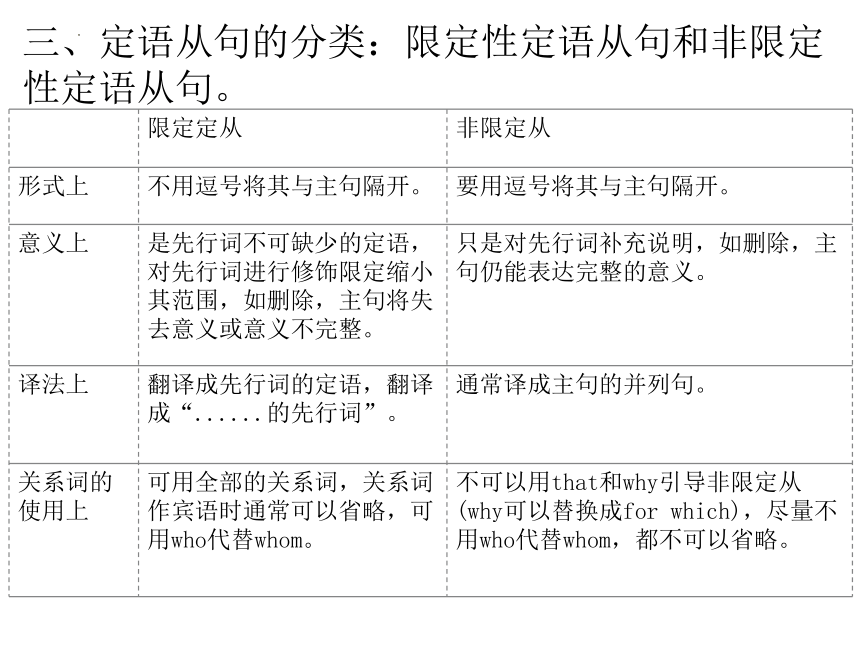
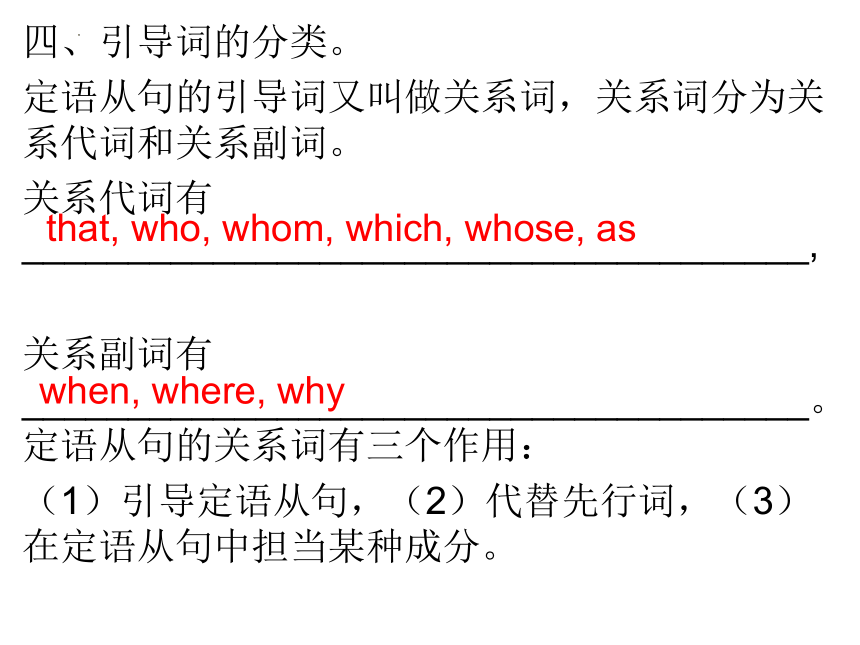
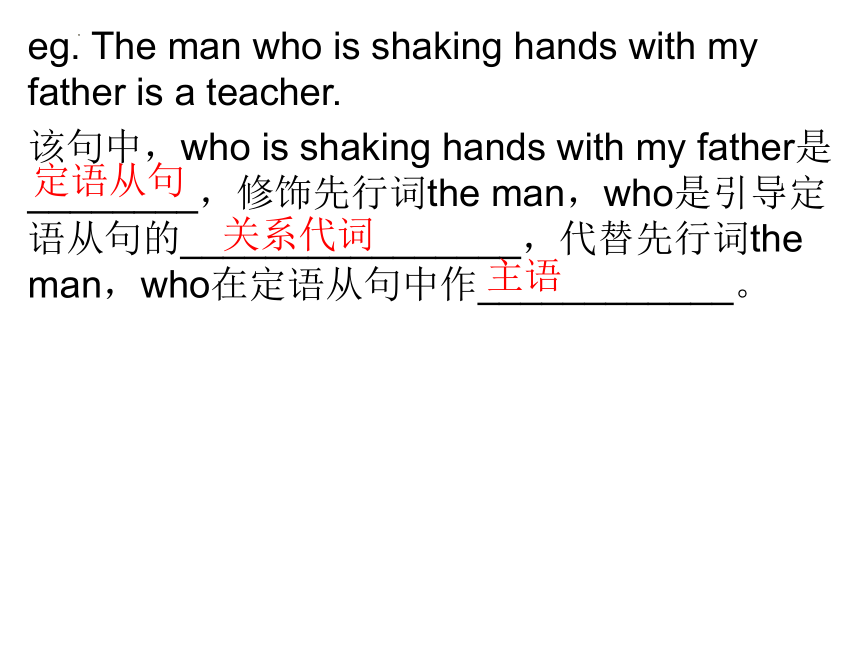
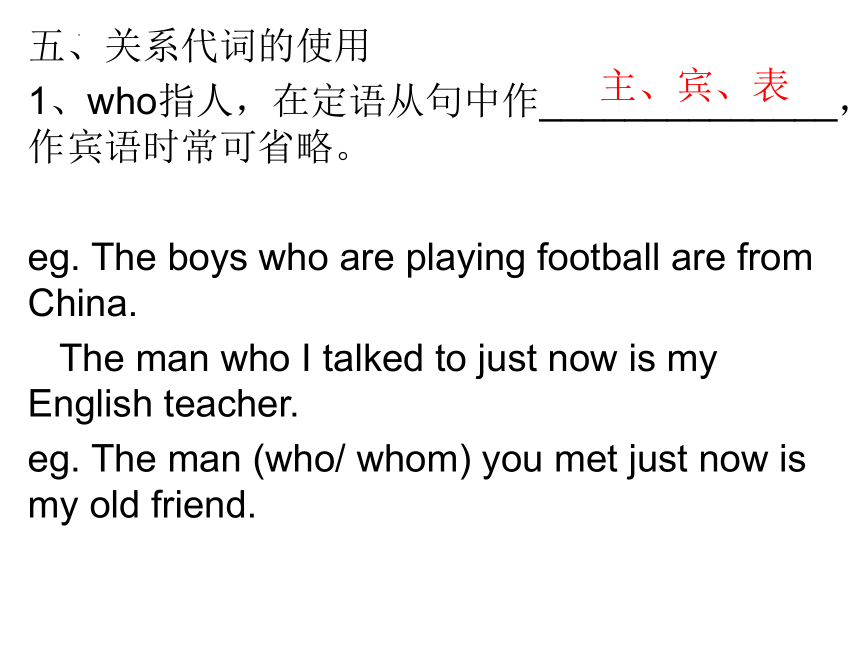
文档简介
(共17张PPT)
定语从句
一、何谓定语?
所谓定语,就是对名词或代词起修饰、说明、限定作用的成分。英语中主要有单词、短语、句子作定语。
eg.
①She is a beautiful girl.
②A study conducted by IUCN shows water pollution is becoming serious.
③She is a girl whom I love.
二、何谓定语从句?
像例句③中用一个句子作整个主句中某一名词或代词的定语时,我们称该句子为________________。即定语从句在整个句子中作定语,并修饰整个句子中的某一名词或代词。
其中被修饰的词(名词或代词)被称作________________。定语从句一般出现在主句中先行词的后面。定语从句通常由一个引导词引导,引导词常放在先行词和定语从句之间。
先行词
定语从句
eg. He is the man who wants to see you.
该句中,He is the man 是____________,who wants to see you 为___________,who为__________,who引导的定语从句修饰整个句子中的先行词____________。
翻译:住在那座房子里的人是我的哥哥。
______________________________________.(定语从句作定语)或______________________________________.(短语作定语)
主句
定语从句
关系代词
the man
The man who lives in the house is my brother.
The man living in the house is my brother
三、定语从句的分类:限定性定语从句和非限定性定语从句。
限定定从 非限定从
形式上 不用逗号将其与主句隔开。 要用逗号将其与主句隔开。
意义上 是先行词不可缺少的定语,对先行词进行修饰限定缩小其范围,如删除,主句将失去意义或意义不完整。 只是对先行词补充说明,如删除,主句仍能表达完整的意义。
译法上 翻译成先行词的定语,翻译成“......的先行词”。 通常译成主句的并列句。
关系词的使用上 可用全部的关系词,关系词作宾语时通常可以省略,可用who代替whom。 不可以用that和why引导非限定从(why可以替换成for which),尽量不用who代替whom,都不可以省略。
四、引导词的分类。
定语从句的引导词又叫做关系词,关系词分为关系代词和关系副词。
关系代词有_____________________________________,
关系副词有_____________________________________。定语从句的关系词有三个作用:
(1)引导定语从句,(2)代替先行词,(3)在定语从句中担当某种成分。
that, who, whom, which, whose, as
when, where, why
eg. The man who is shaking hands with my father is a teacher.
该句中,who is shaking hands with my father是________,修饰先行词the man,who是引导定语从句的________________,代替先行词the man,who在定语从句中作____________。
定语从句
关系代词
主语
五、关系代词的使用
1、who指人,在定语从句中作______________,作宾语时常可省略。
eg. The boys who are playing football are from China.
The man who I talked to just now is my English teacher.
eg. The man (who/ whom) you met just now is my old friend.
主、宾、表
2、whom指人,在定语从句中只作_________,常可省略。
eg. The professor (whom) you are waiting for has come.
<注>关系代词whom在口语或非正式文体中常可用who来代替。
宾
3、which指_______,在定语从句中做______________,作宾语时常可省略。
eg. Football is a game which is liked by most boys.
The factory which makes computers is far away from home.
The film (which) they went to see yesterday was not interesting at all.
物
主、宾
4、that既可以指人也可以指物,在定语从句中作__________,指人时相当于____________;指物时相当于which。作宾语常可省略。
eg. The man that/ who spoke to me just now is my teacher.
The man (that/ whom/ who) you introduced to me is very kind.
The season that/ which comes after spring is summer.
I like the book (that/ which) you bought yesterday.
主、宾、表
who
5、whose指人时=the+ n+ of whom;指物时=the+ n+ of which,在定语从句中做______.
eg. He has a friend whose father is a doctor.
I once lived in a house whose window looks out over the sea.
Do you like the book whose cover is yellow
定语
6、as在定语从句中可做主宾表,既可以指人,也可以指物,常用在the same as, such as, as... as, so... as等结构中,as不可省略;as 也可用在非限定性定语从句中,解释说明整个句子,可放在句首句中句尾,常有“正如,好像”之意。
eg. I want to buy such a computer as you bought yesterday.
As is known to all, the earth is round.
7、介词+关系代词引导的定语从句
关系代词在定语从句中做介词的宾语时,从句常常由“介词+关代”引导。指人时用“介词+whom”,指物时用“介词+which”,表所属用“介词+whose”
eg. The school (that/ which) he once studied in is very famous. =
The school in which he once studied is very famous.
This is the boy (who/ whom/ that) I played tennis with yesterday. =
This is the boy with whom I played tennis yesterday.
<注>*介词的选择依据:①根据定语从句中谓语动词的搭配习惯;②根据先行词的搭配习惯;③根据句意。
*若定语从句的谓语动词为不可拆分的固定搭配时,介词则不前置
8、引导定语从句的关系代词只用that不用which的情况。
①当先行词是all, much, any, little, anything, something, everything, nothing, 等不定代词或被every, any, all, some, no, little, few, much等词修饰时。
eg. Everything that we saw in the film is true.
He told me all that he knew.
All that can be done has been done.
There is little that I can do for you.
②当先行词是序数词或被序数词修饰时,或先行词是形容词最高级或被其修饰时。
eg. The first place that they visited in London was the Big Ben.
This is the best film that I have ever seen.
③当先行词被the very, the only, the right等修饰时。
eg. This is the very book that I want to buy.
The old car is the only thing that he owes.
④当先行词既有人又有物时。
eg. He thought highly of the things and persons that he met in China.
六、关系副词的使用
1、when指时间,在定语从句中作_____________。
eg. I still remember the day when I first came to this school.
I never forget the time when we worked on the farm.
比较:I still remember the days (that/ which) we spend together.
2、where指地点,在定语从句中作____________。
eg. The house where we lived ten years ago has been pulled down.
Is this the place where they fought the enemy
3、why指原因,在定语从句中作_____________。
eg. The reason why he was punished is unknown to us.
时间状语
地点状语
原因状语
定语从句
一、何谓定语?
所谓定语,就是对名词或代词起修饰、说明、限定作用的成分。英语中主要有单词、短语、句子作定语。
eg.
①She is a beautiful girl.
②A study conducted by IUCN shows water pollution is becoming serious.
③She is a girl whom I love.
二、何谓定语从句?
像例句③中用一个句子作整个主句中某一名词或代词的定语时,我们称该句子为________________。即定语从句在整个句子中作定语,并修饰整个句子中的某一名词或代词。
其中被修饰的词(名词或代词)被称作________________。定语从句一般出现在主句中先行词的后面。定语从句通常由一个引导词引导,引导词常放在先行词和定语从句之间。
先行词
定语从句
eg. He is the man who wants to see you.
该句中,He is the man 是____________,who wants to see you 为___________,who为__________,who引导的定语从句修饰整个句子中的先行词____________。
翻译:住在那座房子里的人是我的哥哥。
______________________________________.(定语从句作定语)或______________________________________.(短语作定语)
主句
定语从句
关系代词
the man
The man who lives in the house is my brother.
The man living in the house is my brother
三、定语从句的分类:限定性定语从句和非限定性定语从句。
限定定从 非限定从
形式上 不用逗号将其与主句隔开。 要用逗号将其与主句隔开。
意义上 是先行词不可缺少的定语,对先行词进行修饰限定缩小其范围,如删除,主句将失去意义或意义不完整。 只是对先行词补充说明,如删除,主句仍能表达完整的意义。
译法上 翻译成先行词的定语,翻译成“......的先行词”。 通常译成主句的并列句。
关系词的使用上 可用全部的关系词,关系词作宾语时通常可以省略,可用who代替whom。 不可以用that和why引导非限定从(why可以替换成for which),尽量不用who代替whom,都不可以省略。
四、引导词的分类。
定语从句的引导词又叫做关系词,关系词分为关系代词和关系副词。
关系代词有_____________________________________,
关系副词有_____________________________________。定语从句的关系词有三个作用:
(1)引导定语从句,(2)代替先行词,(3)在定语从句中担当某种成分。
that, who, whom, which, whose, as
when, where, why
eg. The man who is shaking hands with my father is a teacher.
该句中,who is shaking hands with my father是________,修饰先行词the man,who是引导定语从句的________________,代替先行词the man,who在定语从句中作____________。
定语从句
关系代词
主语
五、关系代词的使用
1、who指人,在定语从句中作______________,作宾语时常可省略。
eg. The boys who are playing football are from China.
The man who I talked to just now is my English teacher.
eg. The man (who/ whom) you met just now is my old friend.
主、宾、表
2、whom指人,在定语从句中只作_________,常可省略。
eg. The professor (whom) you are waiting for has come.
<注>关系代词whom在口语或非正式文体中常可用who来代替。
宾
3、which指_______,在定语从句中做______________,作宾语时常可省略。
eg. Football is a game which is liked by most boys.
The factory which makes computers is far away from home.
The film (which) they went to see yesterday was not interesting at all.
物
主、宾
4、that既可以指人也可以指物,在定语从句中作__________,指人时相当于____________;指物时相当于which。作宾语常可省略。
eg. The man that/ who spoke to me just now is my teacher.
The man (that/ whom/ who) you introduced to me is very kind.
The season that/ which comes after spring is summer.
I like the book (that/ which) you bought yesterday.
主、宾、表
who
5、whose指人时=the+ n+ of whom;指物时=the+ n+ of which,在定语从句中做______.
eg. He has a friend whose father is a doctor.
I once lived in a house whose window looks out over the sea.
Do you like the book whose cover is yellow
定语
6、as在定语从句中可做主宾表,既可以指人,也可以指物,常用在the same as, such as, as... as, so... as等结构中,as不可省略;as 也可用在非限定性定语从句中,解释说明整个句子,可放在句首句中句尾,常有“正如,好像”之意。
eg. I want to buy such a computer as you bought yesterday.
As is known to all, the earth is round.
7、介词+关系代词引导的定语从句
关系代词在定语从句中做介词的宾语时,从句常常由“介词+关代”引导。指人时用“介词+whom”,指物时用“介词+which”,表所属用“介词+whose”
eg. The school (that/ which) he once studied in is very famous. =
The school in which he once studied is very famous.
This is the boy (who/ whom/ that) I played tennis with yesterday. =
This is the boy with whom I played tennis yesterday.
<注>*介词的选择依据:①根据定语从句中谓语动词的搭配习惯;②根据先行词的搭配习惯;③根据句意。
*若定语从句的谓语动词为不可拆分的固定搭配时,介词则不前置
8、引导定语从句的关系代词只用that不用which的情况。
①当先行词是all, much, any, little, anything, something, everything, nothing, 等不定代词或被every, any, all, some, no, little, few, much等词修饰时。
eg. Everything that we saw in the film is true.
He told me all that he knew.
All that can be done has been done.
There is little that I can do for you.
②当先行词是序数词或被序数词修饰时,或先行词是形容词最高级或被其修饰时。
eg. The first place that they visited in London was the Big Ben.
This is the best film that I have ever seen.
③当先行词被the very, the only, the right等修饰时。
eg. This is the very book that I want to buy.
The old car is the only thing that he owes.
④当先行词既有人又有物时。
eg. He thought highly of the things and persons that he met in China.
六、关系副词的使用
1、when指时间,在定语从句中作_____________。
eg. I still remember the day when I first came to this school.
I never forget the time when we worked on the farm.
比较:I still remember the days (that/ which) we spend together.
2、where指地点,在定语从句中作____________。
eg. The house where we lived ten years ago has been pulled down.
Is this the place where they fought the enemy
3、why指原因,在定语从句中作_____________。
eg. The reason why he was punished is unknown to us.
时间状语
地点状语
原因状语
